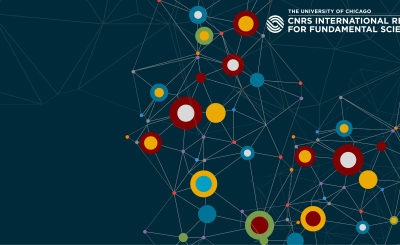
How can IRC Discovery help you?
IRC Discovery supports all areas of collaboration between UChicago and CNRS collaborators, from individual mobility and early-stage network-building to organizing events, implementing research, setting up laboratories, and disseminating findings. We work closely with UChicago Global and many other units across campus to ensure that scholars have the resources they need to build impactful partnerships with French partners.
In 2019, the CNRS and the University of Chicago launched a joint call for proposals to develop cooperation in promising new scientific themes between the two institutions. The agreement is designed to support a series of three-year collaborative research programs for up to 10 new PhD students per year, including students from UChicago and from French universities that host a CNRS research unit. Under the supervision of two primary investigators, one from UChicago and one from CNRS, the program helps PhD students broaden their perspective, gain experience and maturity in leading international research projects, and enhance their scholarly training in preparation for their future professional careers.
// Learn more
This program aims to activate and amplify networks and collaborations among members of the University research community and members of creative, scholarly and research communities in institutions across Europe, Africa, and the Middle East with the aim of laying the groundwork for the forthcoming International Institute for Research in Paris.
// Learn more
France and Chicago Collaborating in the Sciences (FACCTS)* is designed to enhance science at the University of Chicago by encouraging closer relations between researchers in the Physical Sciences Division (PSD), The Biological Sciences Division (BSD), and the Pritzker School of Molecular Engineering (PME) and high-level research teams and institutions of higher education in France. The FACCTS program accomplishes this goal by providing seed funding for new and potentially fruitful project-based collaborations. Through a partnership with Argonne National Laboratory and Fermilab, researchers at these two national laboratories are also eligible for FACCTS support, and are encouraged to apply.
// Learn more
The France Chicago Center invites IRC-Discovery-affiliated research teams in the Humanities and/or Social Sciences to apply for funding (up to $7,500) to help seed promising collaborative research initiatives in their early stages. These grants are best suited for funding activities taking place mostly on the Chicago campus.
// Learn more
The purpose of an International Research Network is to structure an international scientific community around a common theme or research infrastructure. It promotes the organisation of international workshops and seminars, as well as thematic schools organised by the network partners in France and abroad. It brings together, for a duration of five years, researchers from one or more French laboratories, including at least one from the CNRS, as well as from several international partner laboratories.
International Research Projects are collaborative research schemes between one or more CNRS laboratories and one or two laboratories from foreign countries. They strengthen previously-established collaboration through short- and medium-term scientific exchange. They are aimed at organising working meetings or seminars, developing joint research activity including field research, and supervising students. The French and foreign teams concerned must have already shown their capacity to collaborate (for example through one or more joint publications). These programmes have a duration of five years.
International Emerging Actions are PI-to-PI projects whose purpose is to explore new fields of research and international partnerships through: short-term mobility of scientists, the organisation of working meetings, and the initiation of early-stage joint research works for shared scientific projects. These actions have a duration of two years.
// Learn more about CNRS's cooperation toolkit
The Chateaubriand Fellowship is a grant offered by the Embassy of France in the United States. It supports outstanding PhD students from U.S. institutions who wish to conduct part of their doctoral research in France for a period ranging from 4 to 8/9 months. Chateaubriand fellows are selected through a merit-based competition, with expert evaluation in France and in the United States.
// Learn more
The Transatlantic Research Partnership (formerly known as the Thomas Jefferson Fund), is a flagship program bringing together talented young researchers in France and in the United States. Initially launched in 2017 by the French Embassy in the United States and the FACE Foundation, it has been designed to foster forward-looking collaborative research that addresses pressing global challenges. The program supports two-year collaborative projects related to one or more United Nations Sustainable Development Goals (SDGs).
// Learn more
Horizon Europe is the EU’s key funding program for research and innovation, which facilitates collaboration and strengthens impact in developing, supporting and implementing EU policies while tackling global challenges. The Horizon Europe program covers a broad range of efforts including increasing scientific excellence, addressing global challenges and European industrial competitiveness, and building Europe's innovation ecosystem.
The European Research Council, set up by the EU in 2007, is the premiere European funding organization for frontier research. It provides attractive and flexible funding to enable talented and creative individual researchers, with an emphasis on early stage researchers, and their teams to pursue the most promising avenues at the frontier of science, on the basis of EU-wide competition based solely on the criterion of excellence.
The Marie Skłodowska-Curie Actions are the EU flagship programme for doctoral and postdoctoral training, equipping researchers with new knowledge and skills through mobility across borders and exposure to different sectors and disciplines.
// Subscribe to EURAXESS in North America for updates on European Commission funding mechanisms